Writer’s Desk with Adare Elyse
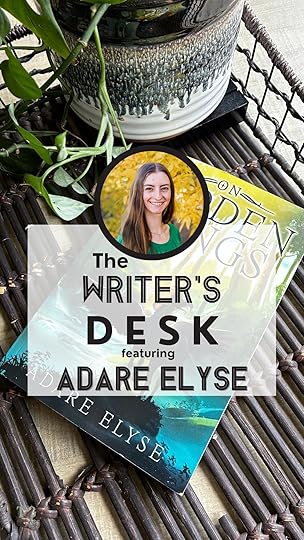 Tricia Goyer
Tricia GoyerAdare Elyse writes middle grade and young adult fantasy and science fiction novels when she isn’t busy dressing in medieval costume, contriving puns with her clever husband, or singing showtunes to her little Shireling. Her work has earned multiple awards, including a Realm Award, and featured in various publications. Powered by tea and epic music, she draws inspiration from the nearby beautiful Rocky Mountains, her travels around the world, and her passion to share uplifting truth in fiction.isty Award-winning and bestselling author of stories that illuminate the ancient world of the Bible, in the hope her readers will dig deeper into the Word and encounter the Great Storyteller himself. A recent breast cancer survivor and adoptive mom of her two greatest gifts, she and her husband live in a small town south of Dallas, Texas.
Connect with Adare on her website, Instagram, Facebook, X, Goodreads, visit the world of On Hidden Wings & find out what fantasy race matches your personality, and get free homeschool curriculum here, and don’t forget to subscribe to her newsletter on her website.
More about On Hidden WingsFirst rule: hide your true self.
Becka‘s secret endangers her life. She’s a winged Centaur in a kingdom now systematically hunting all non-Humans to enslave them—or worse. Her one hope is to use her shapeshifting abilities to hide until her father returns to take her family to safety. But when the army closes in on her secret, Becka can’t wait anymore. If she doesn’t find her father now, she may lose him—or her chance to escape—forever. She’ll do anything to reunite her family—even break into the palace archives to discover her father’s fate.
The last thing she expects to find is a potential ally among the enemy. Locked away in his own castle, young Prince Ryandru also has a secret that has left him desperate for a friend. They’ll have to trust each other to discover the truth they both seek. But with traitors grasping for the throne and Becka’s family in jeopardy, revealing their secrets could destroy all they hold dear.
Jump into the adventure of this clean middle grade fantasy featuring forbidden friendship, accepting your unique self, and a world of mythical creatures including Fauns, Griffins, Pegasi, and more! A perfect choice for fans of The Chronicles of Narnia, Percy Jackson, and The Wingfeather Saga.
Purchase a copy of On Hidden Wings.
Enter to Win a Copy of On Hidden WingsQ&A with Adare ElyseARCF: Can you tell us a little about On Hidden Wings and share the inspiration behind it?
AE: On Hidden Wings is the story of a winged centaur girl hiding in a land where being a non-Human is illegal. She must use her shapeshifting skills to hide her true self until she can reunite with her father and get her family to safety. But in order to find him, she must break into the palace archives to find out what happened to him. The last thing she expects to find is friend in the prince, who has a secret of his own that has left him trapped in his own castle.
Becka is a character who has been flitting around in my head since I first started writing novels in middle school. She first showed up in a short story, and I kept trying to put her into other stories where she just didn’t fit. Finally, I decided to create a world around her so I could tell her story.
ARCF: On Hidden Wings features a winged centaur named Becka. What inspired you to choose a centaur as your protagonist?
AE: She’s a character that has been in my mind for a long time, and she’s unique in a lot of ways. There aren’t a lot of clean books with centaurs as main characters—you see them sometimes as side characters or in less savory subgenres. And I hadn’t seen anyone else with my idea of shapeshifting, where she can shift into any of her component forms or combinations thereof, such as just a human, bird, or horse, or even centaur, Pegasus, or Seraph. I’ve always loved horses, and there seemed to be a gap here where I could do something a little different than most of what’s out there.
ARCF: The novel introduces a richly detailed world with shapeshifting races. Can you share how you developed the unique abilities and cultures of the different species?
AE: I think the reason I’m drawn to mythical creatures like centaurs, griffins, and Pegasi is because I grew up with the Chronicles of Narnia where they weren’t monsters, but people. Each of these creatures have two components, and I thought it would fun for them to be able to shapeshift into each of these components and have a special connection to those animals. So for a Centaur, they could transform into a horse but also have some degree of special communication or kinship with horses. I also wanted them to be able to communicate with each other even in their non-human forms, and I wanted my races that don’t have a human component, like griffins and Pegasi, to be people who can communicate also, so they all have a kind of telepathic ability called heartspeaking. I knew this world had a divine creator, just like ours does, and in this world, he’s called the Lifegiver. In our world, we humans are made in the image of God, and that is a beautiful and important thing. I had to wrestle with what being made in the Creator’s image would mean in a world that has people groups that are part human or not human at all. There is so much more about God’s image than I can unpack since I’m not a theologian, but the one aspect I focused on was that we have a God who creates, and he allows us to create, too. Human races have hands and words that allow them to create and shape things in the world. For my non-human races, they use their hearts instead of their words and have a kind of magic, if you will, that goes along with it to shape the world. Griffins can affect the weather, and Pegasi can encourage life, such as in healing or growing plants.
ARCF: The story explores themes of identity and acceptance. How do you hope young readers will relate to Becka’s journey?
AE: I think Becka’s character really came out of my experience as a young person who was always very unpopular in school, the one who’s getting left out and picked on and who had very different beliefs from what was being taught in public school because of my Christian faith. Becka’s an outsider in her world because she’s a mixed-race child, the daughter of a Centaur and a Seraph, and that’s taboo. What I hope young readers will see in her journey is what I found in mine: that even if you don’t fit in, you are beautifully and intentionally created by a God who loves you, and you are the way that you are for a special reason.
ARCF: The novel is set in a kingdom that hunts non-Humans. How does this societal backdrop influence the characters’ actions and decisions?
AE: That is the driving force behind pretty much all the actions and interactions! Becka always has to hide who she truly is, which is very isolating in addition to the exterior stress of trying to avoid getting arrested and sent to some unknown fate, perhaps imprisonment, forced labor, deportation, or even death. The non-Humans in this story always have to be on the defensive. And on the flip side, you’ll see that some of them have also gone on the offensive to resist the Humans.
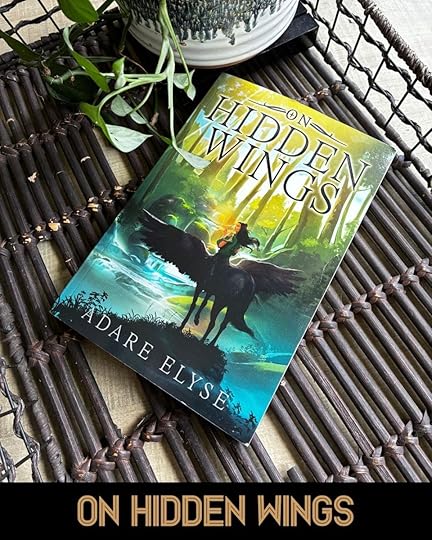
ARCF: The concept of “heartspeaking” is intriguing. Can you share about what inspired this form of communication, and what role does it play in the story?
AE: I guess I already dipped into this already, but heartspeaking is like telepathy but even deeper, because instead of relaying only words from mind to mind, it also can convey feelings. I have two non-linguistic races that don’t communicate in words at all, the Griffins and Pegasi, and for them heartspeaking relays images and emotions. When any of the races communicate with each other, they can understand it in the way their minds work, whether they’re a linguistic or non-linguistic race. Heartspeaking is key for my non-Human races because the Humans can’t heartspeak at all. The non-Humans can have whole conversations that the Humans can’t detect, which is incredibly helpful for the non-Humans who are pretending to be Humans. On the flip side, though, even the heartspeaking isn’t safe because there are some traitors out there who would turn in the other non-Humans they overhear for their own gain. I don’t want to give any spoilers, but Becka’s ability to heartspeak helps her discover a huge secret that shapes the whole rest of the story and the country.
ARCF: You’ve been writing for nearly 20 years. What kept you motivated to pursue publication, especially during challenging times?
AE: Ooh, I admit, it has been a very hard and discouraging road, and a couple of years ago I was in so much despair about how different my journey has been from what I wanted that God actually made me stop working on writing altogether so I could recover. I started writing novels when I was 12 and started pursuing publication at age 14, which I admit was too early because my first novels weren’t very good, but my dream by the time I got out of college was to be a full-time writer. I wrote 11 novels that I cycled through submitting to literary agents and publishers. I had friends along the way who I’d seen get impatient and self-publish before they were what I considered to be at the quality for traditional publishing, and I was so determined not to make that mistake that it became an issue of, “when will I be good enough?” I think a key part of God actually making me stop for about a year was to realize that I am not primarily a writer, I’m a child of God. He already thinks I’m good enough, and I don’t have to prove myself. I needed to trust that He was good and His plans were good enough for me. That’s what finally got me in position so that when he said to independently publish, I could go for it. And that’s why winning the Realm Award was so meaningful for me, because a small part of me still feared that my writing wasn’t good enough—and that award was a sign of His favor to me.
ARCF: On Hidden Wings was indie-published. What were some unexpected challenges and rewards of independent publishing?
AE: The big challenge of indie publishing is that you really have to be a small business owner, not just a writer, and that’s something I definitely dragged my heels on! You don’t have to make an official business like an LLC, but I decided to do that and file all the papers with the government and submit sales tax so I can sell my books at events. But as for the actual publishing part of it, I felt that God was telling me to get out the book that year in 2023, and it was already the end of July when I started, so I had to figure out how to do everything myself in a short amount of time. Next time I definitely want to give myself more of a lead time, because I didn’t even have my book cover back from the designer until the week before the release, which made any kind of advertising hard and preorders impossible. There were all kinds of little quirks like which distributors I could use in what order to get everyone to play nice with Amazon, and I literally called an author I had never met in tears to get her advice on some of those crazy little logistics that can keep the book from getting into readers’ hands. The hardest thing was that my step-daddy unexpectedly died about three weeks before the release, and I didn’t know if I should or even could go on, but I stuck with what I believed God was calling me to do. Because of all that, I really felt like my first book release was a huge failure instead of the wondrous moment that every author dreams of, and it was six months before I could even begin to celebrate the accomplishment. But as for the rewards, it’s really nice to have all the rights to my work so that I can make little tweaks at any time, like putting the Realm Award symbol on the cover, or do derivative works. I have a prequel short story that readers can get for free on my newsletter, and I was invited to create a free homeschool curriculum for it through New Classics Study Guides. I like the idea of doing more companion works like that in addition to sequels.
ARCF: You draw inspiration from the Rocky Mountains and your travels. How have these experiences shaped the world-building in your novel?
AE: To me, the Rocky Mountains are my default fantasy adventure setting, whether I’m reading or writing, since I grew up in the mountains in Colorado. The climate, the way the forests look, and the vistas are frequently much like Colorado. I didn’t realize how ingrained this was until my editor in Arizona asked why it was suddenly chilly when I mentioned the sun was setting in the summer, and I remembered that in an Arizona summer the middle of the night can still be blazing hot because it’s just a different kind of place! That said, I have had the privilege of traveling many places in Europe, which really expanded my worldview because of the different architecture and historical events that happened there and the different foods and languages. I imagine the capital city and palace to look a lot like places I went in England and Scotland. My favorite place I’ve been is New Zealand, because my sister and I just had to do the Lord of the Rings tour, and the dynamic landscape there is just so beautiful and inspiring. I also had a chance to go to China back in 2019, and while that hasn’t significantly influenced any of my stories yet, it really gave me a different view of people and governments and how cultural norms can be incredibly different, but with a little explanation a common understanding can be reached.
ARCF: The book has been compared to The Chronicles of Narnia and The Wingfeather Saga. What elements do you believe align your work with these classics?
AE: The Chronicles of Narnia is my go-to comparison, not because I am in any way saying I come close to Lewis’ brilliance, but because those stories were such an inspiration for the kinds of people in my world. My book also has a component of allegory, although it is pretty light since I want my work to be a crossover that’s approachable even by a secular audience. For the Wingfeather Saga, it’s mostly that both stories have a strong sense and value of family even as these young kids are going out and being brave independently on their own adventures to protect that family and keep it together. I will say the Wingfeather Saga has a much more humorous and whimsical tone than On Hidden Wings, but they are both good clean adventures that parents can feel safe sharing with the whole family.
ARCF: Faith plays a subtle yet significant role in the narrative. How do you weave spiritual themes into your storytelling?
AE: When I was first starting to write novels in middle school, most of what I read was general market fiction because that’s what was available to me and a lot of the Christian works I had read were very cheesy. But the general market books had a lot of darkness, and even the young adult genre that I gravitated toward as a safe genre didn’t stay a safe genre for very long—they were filled with a lot of darkness and hurtful content, too, that I wasn’t ready for. So I wanted to write for the general market clean stories that had hope and light. When someone presents an idea, especially a theological idea, in a non-fiction or real-world setting book, there’s a pressure to immediately accept or reject that idea. But in fantasy, it’s far enough removed from our world that we can examine these worldview ideas without having to make a decision right away. We can ponder, What if God is like this? What if the world is really like this? Stories can touch the heart and shine a light in a less confrontational way, and that’s what I love about fantasy. Since I came from that general market background, I don’t feel like I really write Christian fiction per se, but what I’ve found is writing a story without God in it just doesn’t make any sense. There is no basis for hope without God; it just doesn’t work. The other thing I’ve found is that most of the time I’m not intentionally putting a faith message into the book, but whatever God is teaching me at that point in my life gets woven into the story. I usually can’t even see it until I look back once the story is done and I have a little distance from whatever was happening in my life at the time. Back when I was writing On Hidden Wings, I was fairly new to hearing God’s voice, and he was taking me on a journey out of the bondage of perfectionism and fearing what others would think if I made a mistake by showing me how much he loved me, and that it wasn’t based on what I do but who He created me to be. In this story, Becka is really learning to accept who she is even though she’s different from everyone else, and how to find strength in who she was created to be.
ARCF: The characters face societal prejudice and personal secrets. What message do you hope readers take away regarding empathy and understanding?
AE: I feel like God makes my stories far more profound than I ever intend! But using my English major literary analysis toolkit to look at this book, I would hope that readers would see that a lot of pain and animosity comes from a lack of understanding that we’re more alike than we think, and that even in our differences, we are all created and loved by the same God, and we all have value because of that. I even have to do that in traffic when I see other drivers being rude to me: just take a breath and say this is a person God loves, and there’s probably a circumstance or hurt behind that behavior that I don’t know but God knows, and that takes all the steam out of my anger at them.
ARCF: Becka’s journey is both physical and emotional. How do you balance action with character development in your writing?
AE: You know, I’ve always been a plot-driven writer and reader, but as I’m growing up more (I still feel like a kid in a lot of ways), I’m appreciating more character-driven stories and realizing that the reason we want to read these adventures is because we care about the characters who are having them. We want to see how they learn and share in their triumphs. The physical journey may capture our interest, but it’s the emotional journey that captures our hearts.
ARCF: The novel emphasizes the importance of trust and friendship. How do these themes resonate with your personal values?
AE: Since I was the kind of kid who was a bit more of an outsider, I had just a few friends that I deeply connected with, and as long as I had them with me, it didn’t matter how many people I had against me. It is so precious to have people you can truly confide in who can counsel you wisely and share your experiences. For some people that circle is bigger than for others, but regardless of size, it is so vital. You really can’t have that kind of relationship without trust, and to have trust you need people who are truthful and safe, who will handle your heart with respect and gentleness.
ARCF: Looking back, is there anything you would have done differently in the writing or publishing process?
AE: Definitely would have given myself more time to publish! I still haven’t gotten around to the marketing I should have and maybe still should be doing for this book, but I believe since I haven’t had the bandwidth to do that justice, God has been my promotion team with special blessings like being on this podcast! For writing overall, I wish I had had less of a failure mindset, that if I wasn’t getting an agent or a contract or a contest win that it was still good experience rather than a failure. That’s still something I’m trying to learn.
ARCF: What advice would you offer to aspiring writers, especially those interested in the fantasy genre?
AE: I have always been the kind of person who doesn’t want to have to rely on other people—that’s another area where God is helping me grow—so this might sound weird coming from a lone wolf like me, but find your writing community. Critique groups can be so helpful for improving your craft and inspiring new ideas, or even just nerding out over the same kinds of books can be so enlivening. The other good community-finder option is writing conferences. You can learn so much about writing at conferences and connect with other writers. For me, I didn’t really find that community where I fit until I found Realm Makers, and they get me. In the Christian conferences, I was usually one of the only fantasy writers among people who ranged from not seeing the appeal to thinking it was borderline heresy, and at secular fantasy conferences, the authors had a very different vision for their writing careers and what books should be like. Realm Makers was that perfect fit of people who actually understand what I’m talking about and have the same values. I found my editor because she and I were riding the same shuttle to the airport back from Realm Makers. I actually took her card to give to someone else and then ended up hiring her later for my book!
ARCF: If On Hidden Wings was optioned for film, who would your dream cast be?
AE: Oh dear, I don’t think I can answer this one because I don’t keep up with actor names! While it might make a really cool live action film, I almost think it might be better as an animated film, and I definitely can’t put a name to voice actors! Whatever character they were playing in the first movie I saw them or the movie I watched the most is what I call most of them.
ARCF: And finally, can you share what’s coming up next for you?
AE: I have been on a bit of a maternity leave since I just had my first child in December. An author friend gave me some wonderful advice, which was not to put any pressure on myself to write for six months after the baby came but just let it flow if it does, because having a baby is a huge life change! So, I’m just now getting back to writing and have been dreaming up all kinds of projects. The one I know for sure is that I’m going to write a sequel for On Hidden Wings. It is important to me as a reader that the first book in a series is satisfying enough that it could be a standalone, so that’s what I did with my book, but there are some things that people have been curious about and more I can develop, so that’s my main goal for the next writing project.
Save, Pin, Share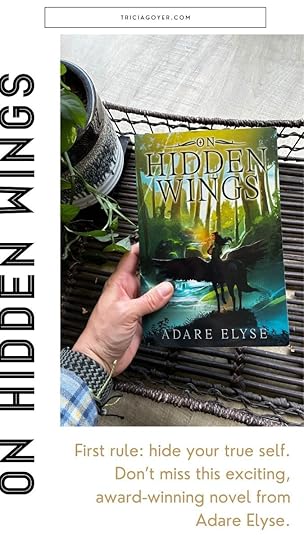
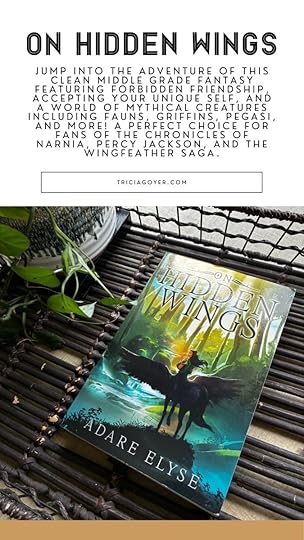
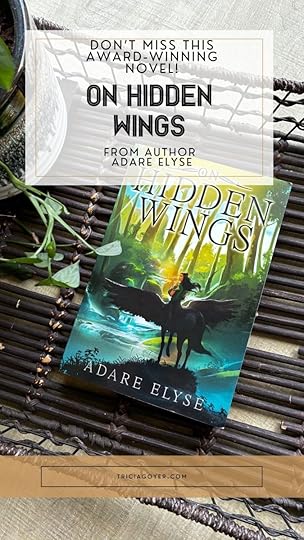 The post Writer’s Desk with Adare Elyse appeared first on Tricia Goyer.
The post Writer’s Desk with Adare Elyse appeared first on Tricia Goyer.



